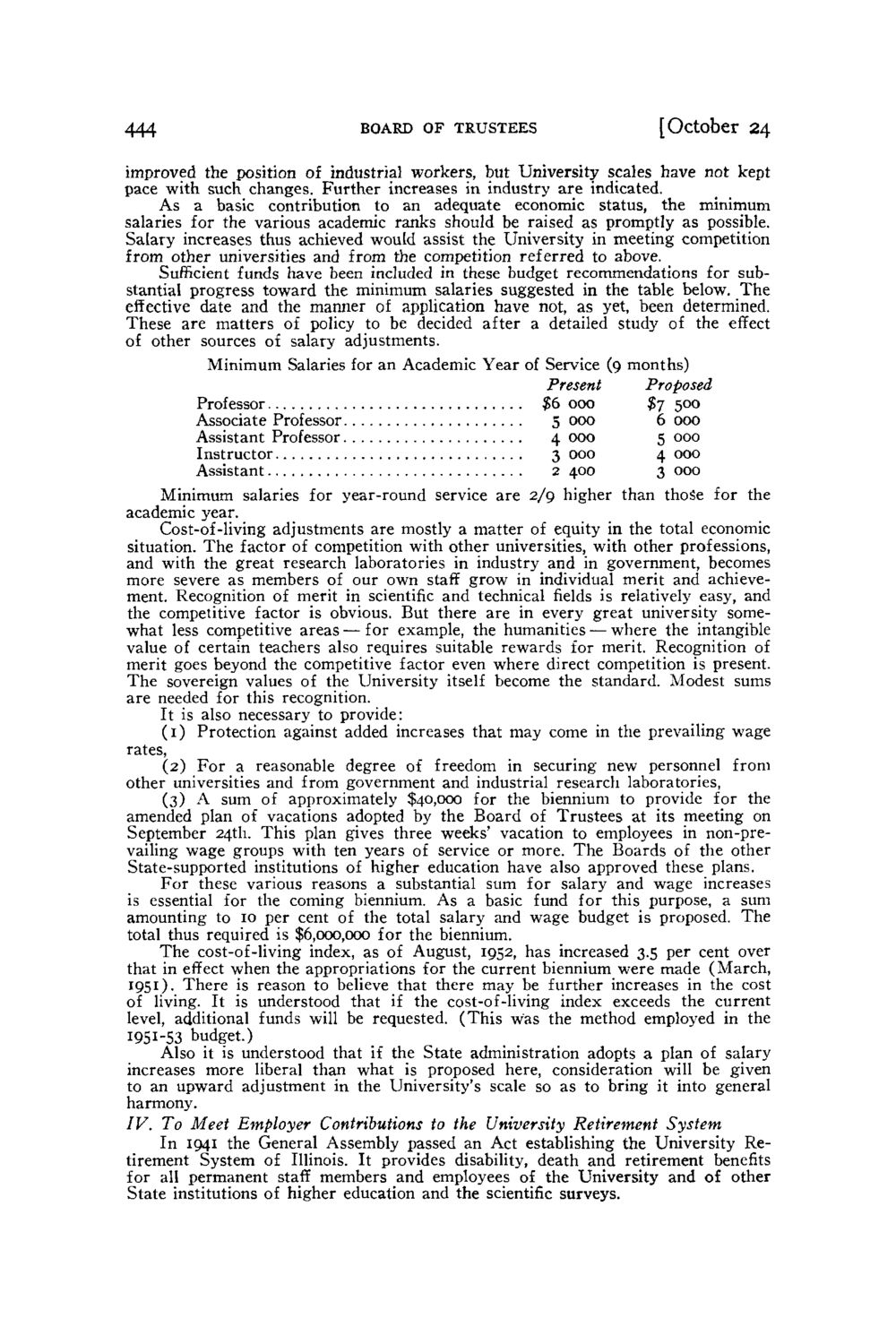| |
| |
Caption: Board of Trustees Minutes - 1954
This is a reduced-resolution page image for fast online browsing.

EXTRACTED TEXT FROM PAGE:
444 BOARD OF TRUSTEES [October 24 improved the position of industrial workers, but University scales have not kept pace with such changes. Further increases in industry are indicated. As a basic contribution to an adequate economic status, the minimum salaries for the various academic ranks should be raised as promptly as possible. Salary increases thus achieved would assist the University in meeting competition from other universities and from the competition referred to above. Sufficient funds have been included in these budget recommendations for substantial progress toward the minimum salaries suggested in the table below. The effective date and the manner of application have not, as yet, been determined. These are matters of policy to be decided after a detailed study of the effect of other sources of salary adjustments. Minimum Salaries for an Academic Year of Service (9 months) Present Proposed Professor $6 000 $7 500 Associate Professor 5 000 6 000 Assistant Professor 4 000 5 000 Instructor 3 000 4 000 Assistant 2 400 3 000 Minimum salaries for year-round service are 2/9 higher than those for the academic year. Cost-of-living adjustments are mostly a matter of equity in the total economic situation. The factor of competition with other universities, with other professions, and with the great research laboratories in industry and in government, becomes more severe as members of our own staff grow in individual merit and achievement. Recognition of merit in scientific and technical fields is relatively easy, and the competitive factor is obvious. But there are in every great university somewhat less competitive areas — for example, the humanities — where the intangible value of certain teachers also requires suitable rewards for merit. Recognition of merit goes beyond the competitive factor even where direct competition is present. The sovereign values of the University itself become the standard. Modest sums are needed for this recognition. It is also necessary to provide: (1) Protection against added increases that may come in the prevailing wage rates, (2) For a reasonable degree of freedom in securing new personnel from other universities and from government and industrial research laboratories, (3) A sum of approximately $40,000 for the biennium to provide for the amended plan of vacations adopted by the Board of Trustees at its meeting on September 24th. This plan gives three weeks' vacation to employees in non-prevailing wage groups with ten years of service or more. The Boards of the other State-supported institutions of higher education have also approved these plans. For these various reasons a substantial sum for salary and wage increases is essential for the coming biennium. As a basic fund for this purpose, a sum amounting to 10 per cent of the total salary and wage budget is proposed. The total thus required is $6,000,000 for the biennium. The cost-of-living index, as of August, 1952, has increased 3.5 per cent over that in effect when the appropriations for the current biennium were made (March, 1951). There is reason to believe that there may be further increases in the cost of living. It is understood that if the cost-of-living index exceeds the current level, additional funds will be requested. (This was the method employed in the I95I-S3 budget.) Also it is understood that if the State administration adopts a plan of salary increases more liberal than what is proposed here, consideration will be given to an upward adjustment in the University's scale so as to bring it into general harmony. IV. To Meet Employer Contributions to the University Retirement System In 1941 the General Assembly passed an Act establishing the University Retirement System of Illinois. It provides disability, death and retirement benefits for all permanent staff members and employees of the University and of other State institutions of higher education and the scientific surveys.
| |